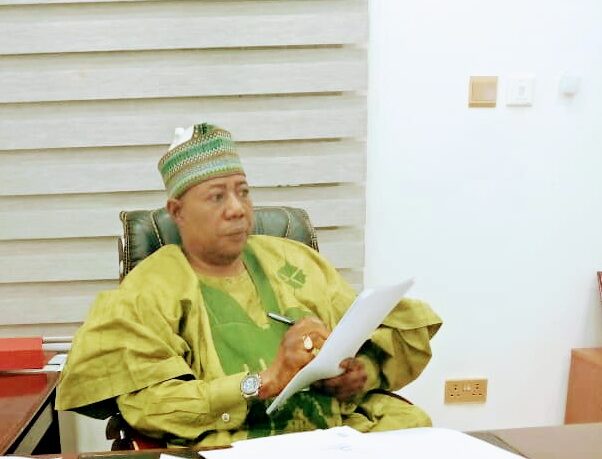Nigeria, a nation brimming with potential and a vibrant cultural tapestry, has long sought to streamline its passport issuance process, a crucial step in facilitating international travels and fostering economic growth. Since the Renewed Hope government led by President Bola Ahmed Tinubu was inaugurated on May 29, the administration has initiated a wide range of reforms aimed at repositioning the country to the status of the Giant of Africa that it truly is.
One key sector that has received most accolades from Nigerians is the nation’s passport system. What Tinubu’s Minister of Internal Affairs, Olubunmi Tunji-Ojo, has achieved with the passport reforms goes to show that with the right people in strategic places, Nigeria can work.
Hitherto, Nigerians at home and in diaspora go through harrowing experience in a bid to get passport. The testimony from diaspora Nigerians has not been so good. But with Tunji-Ojo’s magic wand, the tide is changing. Passport now takes less than a week to process
The Minister of Interior is the chief driver of the Nigerian passport revolution, which even cynics agree has undergone significant reforms under the Renewed Hope Government. It is on record that on assumption of duty at Interior ministry, Tunji-Ojo never hid his disdain for the corrupt system of passport application, worse of which is the passport racketeering at Nigerian Missions the World over. Diaspora Nigerians have been subject of sore exploitation and sometimes sexual abuse all in the name of acquiring a national document, which other countries get at the tap of a button.
The good news is that the Tunji-Ojo-led reforms have streamlined the application process, reduced processing times, and enhanced accessibility, promoting international mobility and economic growth. The government has introduced online passport applications, established dedicated passport application centers, and implemented a tracking system to monitor application status.
These measures have empowered Nigerians to obtain their passports more quickly and efficiently, facilitating international travel for personal and professional purposes.
Furthermore, the enhanced accessibility of passports has enabled Nigerians to actively participate in the global economy. The streamlined passport system has also played a crucial role in emergency situations, enabling Nigerians to obtain travel documents quickly and efficiently during times of crisis. While progress has been made, there is still room for further improvement in Nigeria’s passport system. The government should continue to invest in technology and infrastructure to further expedite the application process and enhance security features.
Additionally, efforts should be made to raise awareness about passport reforms and educate citizens on the benefits of obtaining a passport. Overall, passport reforms in Nigeria under President Tinubu have been a positive development, paving the way for economic growth, cultural exchange, and improved access to humanitarian assistance. As the country continues to strive for integration into the global economy, further improvements to the passport system will play a vital role in achieving its ambitious goals.
Prior to the implementation of reforms the passport application process in Nigeria was plagued by lengthy delays, bureaucratic hurdles and a lack of transparency. These inefficiencies discouraged travel and hindered business opportunities, impeding Nigeria’s integration into the global economy. Recognising the need for a more efficient and user-friendly passport system, the Nigerian government embarked on a series of reforms aimed at modernising the application process and enhancing passport accessibility.
Permit me to state that passport is a symbol of a country’s sovereignty and a source of national pride. It is a document that allows the holder to travel to other countries. The passport also contains information about the holder, such as name, date of birth and nationality.
For example, if a country’s passport is widely accepted, its citizens will be able to travel more easily and freely. This can lead to increased tourism and business opportunities. Additionally, a strong passport can help a country to attract foreign investment and talent.
In contrast, if a country’s passport is not respected, its citizens may face difficulties when traveling. They may be required to obtain visas for many countries, or they may be subject to additional scrutiny at border crossings. This can make it difficult and expensive for people to travel, and it can as well damage the country’s reputation.
Therefore, a country’s passport is an important symbol of its dignity and standing in the world. A strong passport can help a country to achieve its economic, social, and political goals.
One of the key reforms involves the introduction of online passport applications, a significant step towards reducing the administrative burden and expediting the processing time. This initiative has empowered Nigerians to apply for passports from the comfort of their homes, eliminating the need for lengthy physical queues and cumbersome paperwork. Additionally, the government has established dedicated passport application centers across the country, ensuring that citizens have convenient access to passport services.
To further streamline the process, the Nigerian government has implemented a tracking system that allows applicants to monitor the status of their passport applications in real time. This transparency measure has instilled confidence in applicants and reduced the anxiety associated with uncertain waiting periods. Moreover, the government has taken steps to enhance the security features of the Nigerian passport, ensuring its compliance with international standards and preventing forgery or misuse.
The impact of passport reforms in Nigeria has been multifaceted. The streamlined application process has significantly reduced processing times, allowing Nigerians to obtain their passports more quickly and efficiently. This has facilitated international travel for both personal and professional purposes, promoting cultural exchange, tourism, and business opportunities.
By facilitating international business travel and enabling participation in international conferences and events, passport reforms have opened up new avenues for economic growth and development.
In addition to its economic benefits, the streamlined passport system has also played a crucial role in emergency situations. During times of crisis, streamlined passport issuance has enabled Nigerians to obtain travel documents quickly and efficiently, facilitating evacuation and access to humanitarian assistance.
Despite the progress made, there is still room for further improvement in Nigeria’s passport system. The government should continue to invest in technology and infrastructure to further expedite the application process and enhance the security features of Nigerian passports. Efforts should be made to raise awareness about passport reforms and educate citizens on the benefits of obtaining a passport.
In conclusion, it is comfortable to note passport reforms in Nigeria under the leadership of Tunji-Ojo have been a positive development, streamlining the application process, enhancing accessibility, and promoting international mobility. These reforms have paved the way for economic growth, cultural exchange, and improved access to humanitarian assistance. As Nigeria continues to strive for integration into the global economy, further improvements to the passport system will play a vital role in achieving its ambitious goals.
Away from the passport regime, let me digress a bit to leave my friend and brother, the Honourable Minister of Interior with a piece of advice. As leader of the Nigerian Immigration Service, Nigerian Security and Civil Defense Corp, Nigerian Fire Service and the Nigerian Correctional Servicees, Tunji-Ojo should leave no stone unturned in effecting lasting solutions that would protect the national infrastructure in its capital city and even beyond. Not a few Nigerians are looking up to him as one of the tools in the hands of President Tinubu with which he intends to actualise his renewed hope agenda.
– Ibrahim is Director, Communication and Strategic Planning, of the Presidential Support Committee (PSC).



